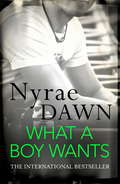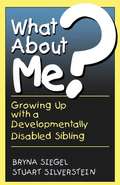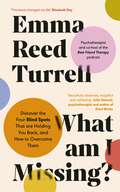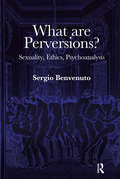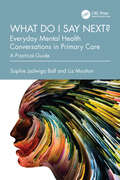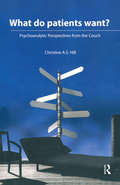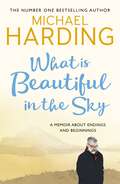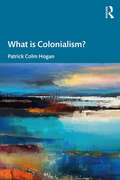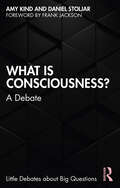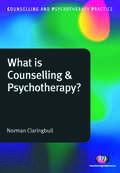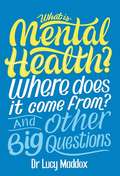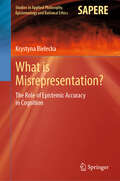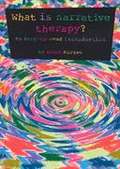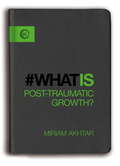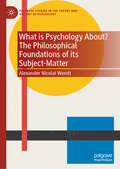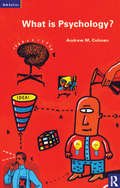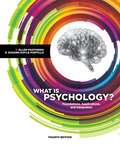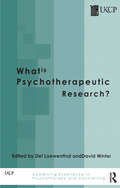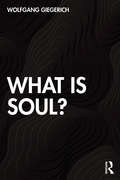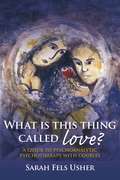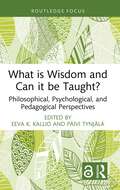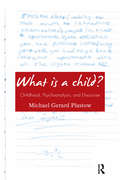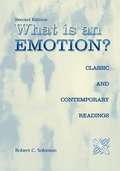- Table View
- List View
What a Boy Wants
by Nyrae DawnIf you adore Jennifer E. Smith's The Statistical Probability of Love at First Sight and Jessica Park's Flat-Out Love, you'll love this book.Courtesy of watching his mom's relationships, Sebastian Hawkins knows what girls need to do to get a guy. He has what he considers a PHD in hooking up. When he needs extra cash for a car, Sebastian starts up an online venture as The Hook-up Doctor, to anonymously help girls land the guy of their dreams. Of course, his services don't offer a happily-ever-after guarantee. He's seen firsthand getting together never means staying together. And then he falls in love... With the last girl he would expect...Totally not in his game plan. Suddenly, Sebastian finds himself muddled in the game he's always prided himself on. He can't even pick up girls at parties anymore! Why would anyone want to be in love when it turns you into a stuttering, screwed-up, mess with really lame stalker tendencies? Stalking? Totally not his gig. But the Hook-up Doctor won't let himself go down easily. He's always known how to give a girl what she wants and now it's time to figure out what a boy wants... and he definitely plans on getting it.A companion novel to What a Boy Needs.
What about me? Growing Up with a Developmentally Disabled Sibling: Growing Up With A Developmentally Disabled Sibling
by Bryna Siegel Stuart SilversteinA compassionate and accessible guide on living with and caring for a developmentally disabled sibling.
What am I Missing?: Discover the Four Blind Spots That are Holding You Back, and How to Overcome Them
by Emma Reed TurrellOne of the UK’s best-loved psychotherapists reveals the blind spots that are clouding our judgement and affecting our relationships, and shares the tools to overcome themHave you ever had a conversation with a friend or relative that’s hit a nerve and you can’t figure out why it bothered you so much? Over the course of her 15-year career, Emma has discovered that the root of this pain and confusion often lies in a blind spot: a gap in our awareness that distorts how we perceive ourselves and our loved ones which, left unchallenged, can leave us feeling unloved, insecure or overwhelmed.In What am I Missing? Emma reveals the four blind spot profiles along with client case studies to demonstrate how they show up in daily life, and exercises to help us see past them:Are you THE GLADIATOR, determined but missing trust?THE BRIDGE, easy-going but missing authenticity?THE HUSTLER, charming but missing self-worth?Or THE ROCK, resilient but missing boundaries?Like sitting with your own therapist, What am I Missing? will help you understand yourself and your loved ones better than ever before, and gives you the keys to a happier life.*****‘This book changed my life' Elizabeth Day‘Beautifully observed, insightful and validating’ Julia Samuel'Gently powerful, helpful and hopeful' Anna Mathur
What are Perversions?: Sexuality, Ethics, Psychoanalysis
by Sergio BenvenutoThis book explores what we mean when we use the term "perversion." Are we dealing with a sexological classification, a mental disturbance, an ethical deviation, a hedonistic style, or an historical-cultural artifact? The book retraces some of the fundamental stages in the field of psychoanalytic thought-from Freud to Masud Khan, Stoller, and Lacan-and proposes an original approach: that "paraphilias" today are taken as an ethical failure of the sexual relationship with the other. The perversions signal a specific relationship with the other, who is treated not simply as a sexual object, but someone whose subjectivity is ably exploited precisely in order to get a perverse pleasure. Acts, if considered perverse, are understood as a metaphorical re-edition of a trauma, above all sexual, in which the subject (as a child) suffered the bitter experience of exclusion or jealousy.
What do I say next? Everyday Mental Health Conversations in Primary Care: A Practical Guide
by Liz Moulton Sophie Jadwiga BallA significant problem experienced by some GPs and many trainees and other primary care health professionals is the challenge of completing a useful and safe consultation with patients with mental health problems within the constraints of a standard-length appointment. These challenges may arise from a lack of specific expertise in this area, poor training in the relevant skills and, perhaps, the attitude that there is not much that the primary care practitioner can do to help.This new book focuses on enhancing the repertoire of communication skills available for mental health consultation, providing a range of tools and techniques drawn from accepted models, including cognitive behavioural therapy (CBT), transactional analysis (TA), motivational interviewing and acceptance commitment therapy (ACT), illustrating how to apply these within a typical 10- to 12-minute primary care consultation.Key features: enhances the repertoire of communication and consultation skills for primary care practitioners working in mental health consultations summaries and quick take-home points aid rapid reference in the time-constrained consultation setting whether in person or virtual offers worked-through model consultations with a variety of patients, showing how to apply the tools and techniques described demonstrates how such consultations can be completed safely and effectively within a normal consultation time frame Essential reading for all primary care practitioners in training and in practice, the book equips readers with the confidence and knowledge to provide excellent mental health care for their patients.
What do Patients Want?: Psychoanalytic Perspectives from the Couch
by Christine A. HillThis book allows patients to speak for themselves about their psychoanalytic experiences. It challenges the preconceived perception that the analytic practitioner "knows best" when it comes to treatment, and responds to the growing sophistication of those seeking the treatment.
What is Beautiful in the Sky: A book about endings and beginnings
by Michael Harding'In these strange days Michael Harding's route taking and wise words gently nudge us towards the future, steadying us as we navigate the great unknowns ahead' Joe Duffy The bestselling new book from acclaimed writer and Irish Times columnist. It's dawn and in the early morning light, Michael Harding is walking in his garden in the hills above Lough Allen in Leitrim, dreaming of the new beginning in Donegal he had planned before the world changed in the early months of 2020. Here, in his stunning and intimate new book, we travel with Michael through this day as he looks back at a life lived within, and as part of, the Irish landscape. In doing so, he vividly brings to life what is at the heart of Irish identity: storytelling, love and human connection. With honesty, insight and tenderness, he shows that while everything has changed, that which is important remains the same; and how, in this new world, we can live with hope and faith in everything that is beautiful in the sky. What is Beautiful in the Sky is an account of our times: a record of our past and a promise of new beginnings. 'This morning is special. The air is cleaner than it used to be. Birds sing with a deeper resonance. The apple trees shed their petals and fatten their fruit with an astonishing defiance; as if nature itself carried a coded message; everything will be OK in the end. Hope may seem lost with each new death but love has become more visible in every hospital corridor in the world."Let's begin again."
What is Beautiful in the Sky: A book about endings and beginnings
by Michael Harding'In these strange days Michael Harding's route taking and wise words gently nudge us towards the future, steadying us as we navigate the great unknowns ahead' Joe Duffy The bestselling new book from acclaimed writer and Irish Times columnist. It's dawn and in the early morning light, Michael Harding is walking in his garden in the hills above Lough Allen in Leitrim, dreaming of the new beginning in Donegal he had planned before the world changed in the early months of 2020. Here, in his stunning and intimate new book, we travel with Michael through this day as he looks back at a life lived within, and as part of, the Irish landscape. In doing so, he vividly brings to life what is at the heart of Irish identity: storytelling, love and human connection. With honesty, insight and tenderness, he shows that while everything has changed, that which is important remains the same; and how, in this new world, we can live with hope and faith in everything that is beautiful in the sky. What is Beautiful in the Sky is an account of our times: a record of our past and a promise of new beginnings. 'This morning is special. The air is cleaner than it used to be. Birds sing with a deeper resonance. The apple trees shed their petals and fatten their fruit with an astonishing defiance; as if nature itself carried a coded message; everything will be OK in the end. Hope may seem lost with each new death but love has become more visible in every hospital corridor in the world."Let's begin again."
What is Beautiful in the Sky: A book about endings and beginnings
by Michael Harding'In these strange days Michael Harding's route taking and wise words gently nudge us towards the future, steadying us as we navigate the great unknowns ahead' Joe Duffy The bestselling new book from acclaimed writer and Irish Times columnist. It's dawn and in the early morning light, Michael Harding is walking in his garden in the hills above Lough Allen in Leitrim, dreaming of the new beginning in Donegal he had planned before the world changed in the early months of 2020. Here, in his stunning and intimate new book, we travel with Michael through this day as he looks back at a life lived within, and as part of, the Irish landscape. In doing so, he vividly brings to life what is at the heart of Irish identity: storytelling, love and human connection. With honesty, insight and tenderness, he shows that while everything has changed, that which is important remains the same; and how, in this new world, we can live with hope and faith in everything that is beautiful in the sky. What is Beautiful in the Sky is an account of our times: a record of our past and a promise of new beginnings. 'This morning is special. The air is cleaner than it used to be. Birds sing with a deeper resonance. The apple trees shed their petals and fatten their fruit with an astonishing defiance; as if nature itself carried a coded message; everything will be OK in the end. Hope may seem lost with each new death but love has become more visible in every hospital corridor in the world."Let's begin again."
What is Colonialism?
by Patrick Colm HoganWhat is Colonialism? develops a clear and rigorous account of what colonialism is and how it works. It draws on and synthesizes recent work in cognitive science, affective science, and social psychology, along with Marxism and related forms of analysis. Hogan begins with some fundamental conceptual distinctions, such as the degree to which a group shares beliefs, dispositions, and skills versus the degree to which they share identification with a category. Building on these distinctions, he defines colonialism in terms of political, economic, and cultural autonomy, clarifying the nature of culture and autonomy particularly. He goes on to articulate an invaluable systematic account of the varieties of colonialism. The final chapters outline the motives of imperialists, differentiating these from their ideological rationalizations, and sketching the harms caused by colonialism. The book concludes by considering when, or if, one can achieve a genuinely postcolonial condition. Hogan illustrates these analyses by examining influential literary works—by European writers (such as Joseph Conrad) and by non-Europeans (such as Athol Fugard, Kamala Markandaya, and Wole Soyinka). This accessible and informative volume is the ideal resource for students and scholars interested in colonialism and empire.
What is Consciousness?: A Debate (Little Debates about Big Questions)
by Daniel Stoljar Amy KindWhat is consciousness and why is it so philosophically and scientifically puzzling? For many years philosophers approached this question assuming a standard physicalist framework on which consciousness can be explained by contemporary physics, biology, neuroscience, and cognitive science. This book is a debate between two philosophers who are united in their rejection of this kind of "standard" physicalism—but who differ sharply in what lesson to draw from this. Amy Kind defends dualism 2.0, a thoroughly modern version of dualism (the theory that there are two fundamentally different kinds of things in the world: those that are physical and those that are mental) decoupled from any religious or non-scientific connotations. Daniel Stoljar defends non-standard physicalism, a kind of physicalism different from both the standard version and dualism 2.0. The book presents a cutting-edge assessment of the philosophy of consciousness and provides a glimpse at what the future study of this area might bring. Key Features Outlines the different things people mean by "consciousness" and provides an account of what consciousness is. Reviews the key arguments for thinking that consciousness is incompatible with physicalism. Explores and provides a defense of contrasting responses to those arguments, with a special focus on responses that reject the standard physicalist framework. Provides an account of the basic aims of the science of consciousness. Written in a lively and accessibly style. Includes a comprehensive glossary.
What is Counselling and Psychotherapy? (Counselling and Psychotherapy Practice Series)
by Norman ClaringbullWritten specifically for students on counselling and psychotherapy courses, this book gives an overview of the profession from its early beginnings in psychotherapy and psychoanalysis through the development of the different schools and approaches of talking therapies including psychodynamic, cognitive behavioural and person-centred approaches. Working within various sectors, such as the commercial, educational and public, is also considered and discussed. The author concludes the book by looking at where counselling and psychotherapy is heading in the future.
What is Mental Health? Where does it come from? And Other Big Questions (And Other Big Questions)
by Lucy MaddoxExploring and explaining the range of mental health, from wellbeing through to mental health problems, in a non-stigmatising, accessible and accurate way.Mental health gets talked about a lot, but what is it? And where does it come from?This book explains what mental health is, considering how it relates to lots of different experiences, from how we manage really big feelings, to how we get on with each other, how we make choices and how we handle stressful situations. The book thoughtfully examines the things that can help us look after our mental health and the things that might make it feel worse. It has suggestions for the support on offer if we feel we're struggling.It includes specially-written contributions from Chamique Holdsclaw, US gold medallist basketballer, academics Dr Suzi Gage and Professor Marianne Van Den Bree, poet Fisky, artists Christine Rai and Liz Atkin, mental health advocate Chineye Njoku and Dr Alan Cooklin, psychiatrist and founder of the charity Our Time which helps children whose parents experience mental health problems.Aimed at young people aged 10 and upwards.Part of the groundbreaking and important 'And Other Big Questions' series, which offers balanced and considered views on the big issues we face in the world we live in today.Other titles in the series include:What is Gender? How does it define us?What is Feminism? Why do we need it?What is Consent? Why is it important?What is Masculinity? Why does it matter?
What is Misrepresentation?: The Role of Epistemic Accuracy in Cognition (Studies in Applied Philosophy, Epistemology and Rational Ethics #71)
by Krystyna BieleckaThis book aims to justify and systematize the desiderata that a satisfying philosophical account of mental representations should meet, which is consistent with common-sense practice and scientific research. According to the author, the most important aspect of any satisfactory account of mental representation is the ability to determine that a given representation is incorrect and to identify the nature of the error. The book analyzes selected contemporary theories of mental representations with respect to major desiderata as well as the minor desiderata that they subsume, discussing the requirements for the philosophical accounts of particular types of mental representations. Since none of the previously proposed concepts meet this requirement satisfactorily, the author proposes an alternative theory of misrepresentation, which is based on the idea that epistemic accuracy is what minds care about. According to the author’s findings, cognitive systems rely on complex devices to check for coherence between these representations. In turn, the ideas presented here support the active role of mental representation in practice as an error-checking device in agreement with previous teleosemantics accounts.
What is Narrative Therapy: An Easy to Read Introduction
by Alice MorganWhat is narrative therapy? This easy-to-read introduction seeks to answer this question through the use of accessible language, a concise structure and a wide range of practical examples. This book covers a broad spectrum of narrative practices including externalisation, re-membering, therapeutic letter writing, the use of rituals, leagues, reflecting teams and much more. If you are a therapist, health worker or community worker who is trying to, or is wanting to apply narrative ideas in your own work context, this book has been written with you in mind.
What is Post-Traumatic Growth?
by Miriam AkhtarTrauma occurs when extremely stressful events shatter your emotional and psychological well-being, overwhelming your ability to cope. Research by the charity PTSD UK has found that 1 in 2 people will experience trauma at some point in their life, and 20% of those will develop post-traumatic stress. This fascinating and accessible book explains the many varied forms trauma can take, shows how to recognize signs of post-traumatic stress, and offers resilience-building strategies to go beyond 'coping' with it in order to grow from it instead – proving that what doesn't kill you can indeed make you stronger. After an insightful introduction about why the subject of post-traumatic growth is so worth exploring, each main chapter addresses key questions such as: What is trauma and what is post-traumatic stress? What is meant by the concept of post-traumatic growth and what makes it possible? How do you cope in the midst of trauma? How can you strengthen your resilience to keep going? And, finally, how can you actively facilitate post-traumatic growth and how can it change things for the better? As such, this book brings readers on an exploratory journey through the world of post-traumatic growth, reframing how readers view trauma and showing them how they can emerge from its shadow with a new appreciation for life, greater well-being and a higher level of functioning.
What is Psychology About? The Philosophical Foundations of its Subject-Matter (Palgrave Studies in the Theory and History of Psychology)
by Alexander Nicolai WendtThis book examines the subject-matter of psychology against the background of the philosophical problem of reality. It locates the core of the issue in the dualistic conception of reality which, it argues, has left psychologists with a conceptually constrained choice of subject-matter, for instance between experience and behavior, not to mention philosophically incomplete ways of discussing its possible subject-matters. By drawing on the work of philosophers and philosophically informed psychologists, the book seeks to explain and advance the long-standing debate by introducing the under-utilized perspective of ideal-realism. The historical origins and trajectory of ideal-realism are recovered from the late 18th century through the early 20th century. The exposition of this tradition, especially in the little-known German Realpsychologie, provides theoretical psychology with a philosophically founded understanding of its subject-matter.
What is Psychology?
by Andrew ColmanThis clear and lively introduction to psychology assumes no prior knowledge of the subject. Extensively revised and updated, this third edition describes psychology as it is taught at universitues. Examples are used throughout to illustrate fundamental ideas, with a self-assessment quiz focusing readers' minds on a number of intriguing psychological problems. The differences betwen psychology, psychiatry and psychoanalysis are explained, and the professions and careers associated with psychology are explored. Suggestions for further reading and useful internet sites are included.
What is Psychology?: Foundations, Applications, and Integration
by Ellen E. Pastorino Susann M. Doyle-PortilloWHAT IS PSYCHOLOGY? FOUNDATIONS, APPLICATIONS, AND INTEGRATION includes some of the most effective features from Pastorino and Doyle-Portillo's other texts, as well as new and innovative features to excite students about the field of psychology. The text is organized around the foundational areas of psychology emphasized in the latest version of the APA guidelines. It incorporates the authors' successful and engaging teaching approach, which motivates students to read and captures their curiosity from the very beginning. The parts open with attention-grabbing case studies that have drawn rave reviews from students. Each case study is threaded throughout all of the chapters of the section, providing students with a view of the content that is both integrated and applied to real life.
What is Psychotherapeutic Research? (Ukcp Karnac Ser.)
by Del Loewenthal David WinterThis book marks an important watershed in the development of psychotherapy. It provides examples of how psychotherapeutic research and the abilities to carry it out can help the practising psychotherapist. A lack of relative knowledge of research in psychotherapy, a history of apparent defensiveness is being evaluated, and a reluctance to work with universities has developed in psychotherapy. The papers represent a cross-section of current research thinking from within the UKCP, North America and Continental Europe. It will prove useful for students and practitioners of psychotherapy, as well as those more traditionally engaged in psychotherapeutic research.The book has been divided into five sections: Section One outlines what is meant by psychotherapeutic research and gives an overview of the features of different research methods. Section Two describes how to get started in the use of qualitative and quantitative methods. Section Three focuses on research into the process of psychotherapy.
What is Soul?
by Wolfgang GiegerichRooted in the metaphysics of bygone times, the notion of soul in our Western tradition is packed with associations and meanings that are incompatible with the anthropological and naturalistic thinking that prevails in modernity. Whereas treatises of old conceived of the soul as an infinite, immaterial substance which was the ground of man’s hope for eternal salvation, modern psychology has for the most part discarded the concept in favor of more tangible touchstones such as the emotions, desires, and attachments which characterize man as a finite, bodily-existing positive fact. An exception to this trend has been the analytical psychology of C. G. Jung. Against the positivistic spirit of his times, Jung insisted upon a "‘psychology with soul,’ that is, a psychology based upon the hypothesis of an autonomous mind." In this volume, Wolfgang Giegerich once again takes up the Jungian commitment to a psychology with soul. Agreeing with Jung that the soul concept is indispensable for a truly psychological psychology, he supplements and re-orients the Jungian approach to both this concept and the phenomenology of the soul by means of a whole series of nuanced discussions that are as rigorous as they are thoroughgoing. The result is nothing short of a tour de force. Tarrying with the negative, Giegerich’s particular contribution resides in his showing the movement against the soul to be the soul’s own doing. In animus moments of itself, consciousness in the form of philosophy and Enlightenment reason turned upon itself as religion and metaphysics. Far from abolishing the soul, however, these incisive negations were themselves negated. As if dancing upon its own demise, the soul came home to itself, not as an invisible metaphysical substance, but more invisibly still as the logically negative evaporation of that substance into the form of subject, or even better said, into psychology.
What is This Thing Called Love?: A Guide to Psychoanalytic Psychotherapy with Couples
by Sarah Fels UsherWhat is This Thing Called Love? provides a clear how-to guide for carrying out psychotherapy with couples from a psychoanalytic perspective. The book draws on both early and contemporary psychoanalytic knowledge, explaining how each theory described is useful in formulating couple dynamics and in working with them. The result is an extremely practical approach, with detailed step-by-step instructions on technique, illuminated throughout by vivid case studies. The book focuses on several key areas including: An initial discussion about theories of love. Progression of therapy from beginning to termination. Transference and countertransference and their unique manifestations in couples therapy. Comparisons between couples therapy and individual therapy. Step-by-step instruction on technique. What is This Thing Called Love? is enlivened with humour and humanness. It is crucial reading for psychoanalytic therapists, psychologists, psychiatrists, couples therapists and students who want to learn about--or augment their skills in--this challenging modality.
What is Wisdom and Can it be Taught?: Philosophical, Psychological, and Pedagogical Perspectives (Advances in Theoretical and Philosophical Psychology)
by Päivi Tynjälä Eeva K. KallioWhat is Wisdom and Can it be Taught? uses careful theoretical analysis and a well-argued ontological conception of the human being to present a new ‘Holistic Wisdom Model’, summarizing existing research and presenting fresh insights.Human wisdom is a complex phenomenon. Psychological research in this area has led to a wide range of fragmentary claims and models, and therefore, there is a need for theoretical clarification of the field: What is wisdom? How should we study it in the first place? Is it a purely psychological phenomenon, or do we also need philosophy? This book examines these questions, as well as provides a pedagogical review of wisdom to evaluate how people become wise(r) and whether wisdom can be taught. Drawing on findings from a range of educational fields, it shows the crucial features of wisdom-enhancing pedagogies we already know, which are summarized in a ‘Teaching for Wisdom Model’.Written by leading, interdisciplinary scholars, this book illuminates the study of wisdom for researchers, academics, teachers, and students of psychology, philosophy, and education.
What is a Child?: Childhood, Psychoanalysis, and Discourse
by Michael Gerard PlastowThis book unravels the different notions of time and history that are implicit in the history of child psychoanalysis and in the clinical approach to childhood. It is based, in part, on topics that have been addressed in the seminar Psychoanalysis and the Child.
What is an Emotion?: Classic and Contemporary Readings
by Robert C. SolomonWhat is an Emotion?, 2/e, draws together important selections from classical and contemporary theories and debates about emotion. Utilizing sources from a variety of subject areas including philosophy, psychology, and biology, editor Robert Solomon provides an illuminating look at the "affective" side of psychology and philosophy from the perspective of the world's great thinkers. Part One of the book features five classic readings from Aristotle, the Stoics, Descartes, Spinoza, and Hume. Part Two offers classic and contemporary theories from the social sciences, presenting selections from such thinkers as Charles Darwin and Sigmund Freud alongside recent work from Paul Ekman, Catherine Lutz, and others. Part Three presents some of the extensive work on emotion that developed in Europe over the past century. Part Four includes essays representing the discussion of emotions among British and American analytic philosophers. The volume is enhanced by a comprehensive introduction by the editor and a multidisciplinary bibliography. What is an Emotion? is appropriate for any course in which the nature of emotion plays a major role, including philosophy of emotion, philosophy of mind, history of psychology, emotion and motivation, moral psychology, and history and psychology of consciousness courses. The second edition provides much more material on emotions in the sciences and more from recent philosophical theories, encompassing recent shifts in theorizing on three fronts: the wealth of new information on the central nervous system and the brain; new developments in cross-cultural research and anthropology; and the recent emphasis on "cognition" in emotion, both in philosophy and the social sciences. New selections include work by Antonio Damasio, Ronald De Sousa, Paul Ekman, Nico Frijda, Patricia Greenspan, Paul Griffiths, Richard Lazarus, Catherine Lutz, Martha Nussbaum, and Michael Stocker.
